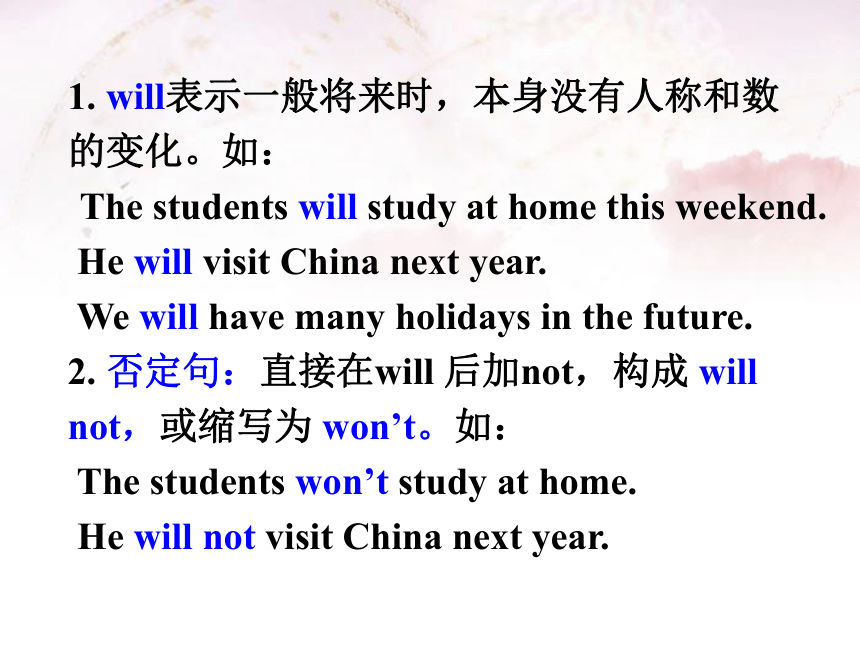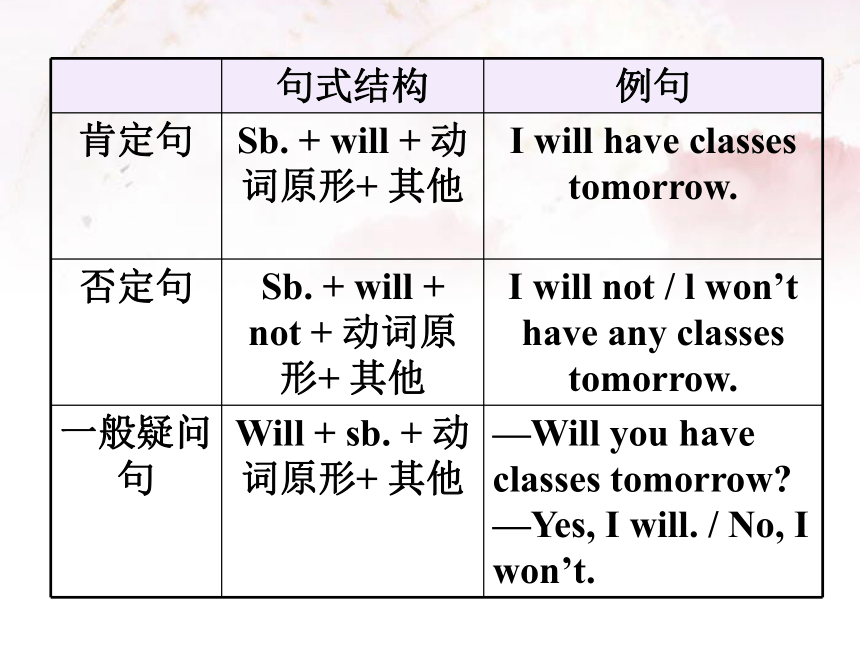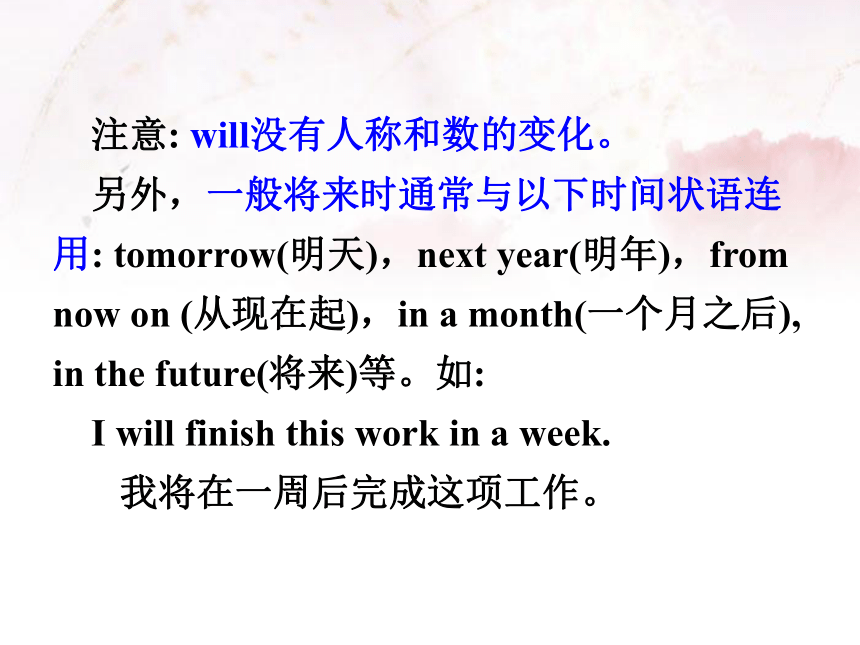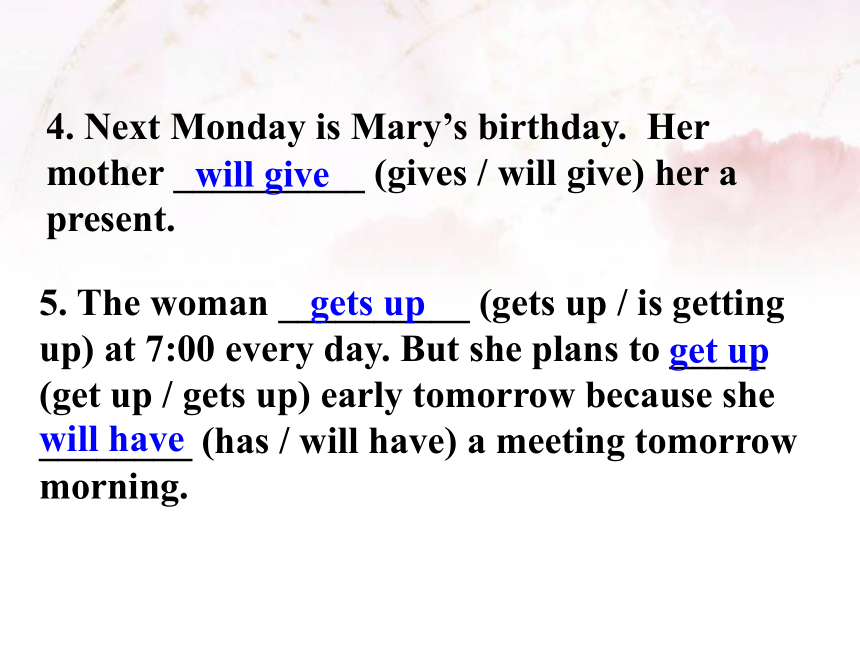Module 4 Life in the future Unit 3 Language in use (共45张PPT)
文档属性
| 名称 | Module 4 Life in the future Unit 3 Language in use (共45张PPT) |

|
|
| 格式 | zip | ||
| 文件大小 | 3.3MB | ||
| 资源类型 | 教案 | ||
| 版本资源 | 外研版 | ||
| 科目 | 英语 | ||
| 更新时间 | 2019-04-26 00:00:00 | ||
图片预览












文档简介
Unit 3 Language in use
Faith Hill
— There you’ll be
Read the sentences and pay attention to the underlined parts.
Every family will have a small plane.
Teachers won’t use chalk on a blackboard.
What will life be like in the future?
Will schools be different in the future?
Yes, they will.
一般将来时(2)
当我们表达按照主观意图、打算或计划安排将要做的事情时,通常用be going to来表达;
当我们表达客观上将来势必会发生的事情,或对未来的预测时,则通常用“will + 动词原形”来表达。
现以“have classes”为例,一起看一下它的具体用法。
1. will表示一般将来时,本身没有人称和数的变化。如:
The students will study at home this weekend.
He will visit China next year.
We will have many holidays in the future.
2. 否定句:直接在will 后加not,构成 will not,或缩写为 won’t。如:
The students won’t study at home.
He will not visit China next year.
3、一般疑问句:把will 提到句首。
肯定回答:主语+ will.
否定回答:主语+won’t.
如:Will the students study at home?
Yes, they will.
No, they won’t.
????
句式结构 例句
肯定句 Sb. + will + 动词原形+ 其他 I will have classes tomorrow.
否定句 Sb. + will + not + 动词原形+ 其他 I will not / l won’t have any classes tomorrow.
一般疑问句 Will + sb. + 动词原形+ 其他 —Will you have classes tomorrow? —Yes, I will. / No, I won’t.
注意: will没有人称和数的变化。
另外,一般将来时通常与以下时间状语连用: tomorrow(明天),next year(明年),from now on (从现在起),in a month(一个月之后), in the future(将来)等。如:
I will finish this work in a week.
我将在一周后完成这项工作。
一般将来时用法歌诀
一般将来时,将要发生事。
谓语不一般,will加动原(动词原形)。
要变疑问句,will放在主语前。
否定句,也不难,will后面not添。
1. I __________ (will leave / leave) in a minute.
2. —Where is your sister, Jane?
—She ___________ (is doing / does) her homework in her room. She ___________ (will play / is playing) football with her friends after that.
3. I _____ (am / will be) free today, so I _____ (go / will go) to bed early tonight.
Fill in the blanks.
will leave
is doing
will play
am
will go
5. The woman __________ (gets up / is getting up) at 7:00 every day. But she plans to _____ (get up / gets up) early tomorrow because she ________ (has / will have) a meeting tomorrow morning.
4. Next Monday is Mary’s birthday. Her mother __________ (gives / will give) her a present.
will give
gets up
get up
will have
2. — Will his parents go to the US tomorrow?
— No, _______.
A. they willn’t B. they won’t
C. they aren’t D. they don’t
B
Choose the best answer.
1. There _______ a birthday party this
Sunday.
A. shall be B. will be
C. shall going to be D. will going to be
B
( ) 3. There ________ a fashion show this
Sunday.
A. shall be B. will be
C. shall going to be D. will going to be
( ) 4. They ________ an English evening
next Sunday.
A. have B. are going to have
C. will having D. is going to have
B
B
( ) 5. ________ you ________ free next
Sunday?
A. Will; are B. Will; be
C. Do; be D. Are; be
( ) 6. He ________ there at ten tomorrow
morning.
A. will B. is
C. will be D. be
B
C
( ) 7. ________ your brother ________ a
magazine from the library?
A. Are; going to borrow
B. Is; going to borrow
C. Will; borrows
D. Are; going to borrows
( ) 8. — Shall I come again tomorrow
afternoon?
— ________.
A. Yes, please B. Yes, you will
C. No, please D. No, you won’t
B
A
( ) 9. It ________ the year of the snake
next year.
A. is going to be B. is going to
C. will be D. will is
( ) 10. ________ open the window?
A. Will you please B. Please will you
C. You please D. Do you
A
A
( ) 11. — Let’s go out to play football, shall we?
— OK. I ________.
A. will coming B. be going to come
C. come D. am coming
( ) 12. It ________ us a long time to learn
English well.
A. take B. will take
C. spends D. will spend
D
B
“be going to+动词原形”结构和“will+动词原形”结构的区别
be going to主要用于:
①表示事先经过考虑、安排要做的事情。如:
What are you going to do after school?
②表示根据前面某种迹象判断某事很有可能发生。 如:
Look at the clouds. It’s going to rain.
2. will主要用于:
①在口语中所有人称都可用will。如:
I’ll telephone you after I get home.
He will have dinner with the nice girl one day.
②will表示单纯的将来概念,表示“将要”,通常可用各种人称。
It’ll soon be Christmas. I will see you tomorrow.
③表示不以人的意志为转移的自然发展的未来事情, 用will。如:
Tom will be sixteen years old next year.
④问对方是否愿意做某事和表示客气的邀请或命令 时,常用will。口语中常用would代替will。如:
Will you please open the door?
⑤表示带“意愿”色彩的将来时,用will。如:
Tom will help me with my English.
________________ (use) pens and paper?
________________ (read) books?
_________________ (travel) by small plane?
4. _________________ (send) emails to teachers?
Will students use
Will students read
Will people travel
Will students send
Read the example and then complete the questions about the future.
______________ (go) to school in the future?
Will students go
Ask and answer the questions in Activity 1.
— Will students go to school in the future?
— Yes, they will.
— No, they won’t.
— Will students read books?
— Yes, they will.
— No, they won’t.
— Will students use pens and paper?
— Yes, they will.
— No, they won’t.
— Will students send emails to teachers?
— Yes, they will.
— No, they won’t.
— Will people travel by small plane?
— Yes, they will.
— No, they won’t.
Put the words in brackets in the correct places in the sentences.
They’ll have a lot of time! (free)
They’ll have a lot of free time!
1. People won’t have any jobs. (difficult)
2. Robots will do work on farms. (heavy)
People won’t have any difficult jobs.
Robots will do heavy work on farms.
3. People will have holidays. (long)
4. There will be rain this evening. (light)
People will have long holidays.
There will be light rain this evening.
Put the words and expressions from the box into the correct columns.
email heavy rain heavy work hot summer interesting job Internet small plane traffic jam
warm winter wind
Weather
Travel
Job
Computer
heavy rain hot summer
warm winter wind
heavy work interesting job
email Internet
small plane traffic jam
the robots
日本是机器人生产、研发和使用大国。二战后,日本的劳动力不足,从美国购买了大量的机器人来替代人工,后来日本又在这些机器人上进行钻研和改进,从而使本身的机器人产业快速发展起来,而且由于日本地少人多,人口老龄化严重,长期以来日本对机器人比较重视,特别是在服务机器人和工业机器人方面,都在世界遥遥领先。
Read and discuss.
What can the robots do in Japan?
Robots can clean the house and play with people.
The robot will play table tennis with people.
The robot will play music for people.
The robot will do the housework for people.
The robot will cook for people.
The robot will play games with people.
The robot will wash clothes for people.
Do you like the robot? Please draw a picture of your robot and give it a name.
Making a poster about life in the future in your hometown.
Think about life in the future.
School Homes
Travel Weather
Work in groups of four. Talk about your ideas. Decide on five good ideas.
— How will our homes change?
— There will be more machines …
— What will school be like in the future?
— The teacher won’t write on a blackboard …
— Will we find new ways to travel?
— Yes, we will. We’ll …
— Will the weather change?
— Yes, it will. It will be …
Make a poster about Life in the future.
Our life will change greatly in the future. In the future, every family will own computers and we can shop online without going out. That is really fantastic. Also every family will employ robots. They can
The sample
help do much of the housework. So family members will have more free time to spend together. In the future, kids don’t need to go to school any more. There is Internet access in every family, and with its help kids can study at home by themselves.
1. it, be, in, will, in, cool, warm, winter, summer, and(连词成句) ______________________________________
2. Students will have more homework to.(改为否定句)
______________________________________
3. He comes back home.(用next Monday改写句子)
______________________________________
Rewrite the sentences.
It will be warm in winter and cool in summer.
Students won’t have more homework to do.
He will come back home next Monday.
4. Everyone will have a car in the future. (改成一般疑问句,并作肯定回答)
__________________________________
__________________________________
5. We will celebrate Spring Festival in Beijing this year. (对画线部分提问)
______________________________
______________________________
Will everyone have a car in the future?
Yes, they will.
Where will you celebrate Spring Festival this year?
1. 明天会有大雨。
There will be ______ ______ tomorrow.
2. 晚上天气正渐渐转凉。
It ___ _______ _____ in the evening.
3. 我们未来的生活会是什么样?
What will our life be like ____ _____ ______?
4. 我空闲时喜欢阅读。
I like reading _____ _____ ______ ______.
5. 汤姆一周上两次语文课。
Tom has Chinese classes ____ ______ ___ _____.
Complete the sentences.
heavy rain
is getting cold
in the future
in my free time
two times a week
Write a short passage about “Life in the future”.
Faith Hill
— There you’ll be
Read the sentences and pay attention to the underlined parts.
Every family will have a small plane.
Teachers won’t use chalk on a blackboard.
What will life be like in the future?
Will schools be different in the future?
Yes, they will.
一般将来时(2)
当我们表达按照主观意图、打算或计划安排将要做的事情时,通常用be going to来表达;
当我们表达客观上将来势必会发生的事情,或对未来的预测时,则通常用“will + 动词原形”来表达。
现以“have classes”为例,一起看一下它的具体用法。
1. will表示一般将来时,本身没有人称和数的变化。如:
The students will study at home this weekend.
He will visit China next year.
We will have many holidays in the future.
2. 否定句:直接在will 后加not,构成 will not,或缩写为 won’t。如:
The students won’t study at home.
He will not visit China next year.
3、一般疑问句:把will 提到句首。
肯定回答:主语+ will.
否定回答:主语+won’t.
如:Will the students study at home?
Yes, they will.
No, they won’t.
????
句式结构 例句
肯定句 Sb. + will + 动词原形+ 其他 I will have classes tomorrow.
否定句 Sb. + will + not + 动词原形+ 其他 I will not / l won’t have any classes tomorrow.
一般疑问句 Will + sb. + 动词原形+ 其他 —Will you have classes tomorrow? —Yes, I will. / No, I won’t.
注意: will没有人称和数的变化。
另外,一般将来时通常与以下时间状语连用: tomorrow(明天),next year(明年),from now on (从现在起),in a month(一个月之后), in the future(将来)等。如:
I will finish this work in a week.
我将在一周后完成这项工作。
一般将来时用法歌诀
一般将来时,将要发生事。
谓语不一般,will加动原(动词原形)。
要变疑问句,will放在主语前。
否定句,也不难,will后面not添。
1. I __________ (will leave / leave) in a minute.
2. —Where is your sister, Jane?
—She ___________ (is doing / does) her homework in her room. She ___________ (will play / is playing) football with her friends after that.
3. I _____ (am / will be) free today, so I _____ (go / will go) to bed early tonight.
Fill in the blanks.
will leave
is doing
will play
am
will go
5. The woman __________ (gets up / is getting up) at 7:00 every day. But she plans to _____ (get up / gets up) early tomorrow because she ________ (has / will have) a meeting tomorrow morning.
4. Next Monday is Mary’s birthday. Her mother __________ (gives / will give) her a present.
will give
gets up
get up
will have
2. — Will his parents go to the US tomorrow?
— No, _______.
A. they willn’t B. they won’t
C. they aren’t D. they don’t
B
Choose the best answer.
1. There _______ a birthday party this
Sunday.
A. shall be B. will be
C. shall going to be D. will going to be
B
( ) 3. There ________ a fashion show this
Sunday.
A. shall be B. will be
C. shall going to be D. will going to be
( ) 4. They ________ an English evening
next Sunday.
A. have B. are going to have
C. will having D. is going to have
B
B
( ) 5. ________ you ________ free next
Sunday?
A. Will; are B. Will; be
C. Do; be D. Are; be
( ) 6. He ________ there at ten tomorrow
morning.
A. will B. is
C. will be D. be
B
C
( ) 7. ________ your brother ________ a
magazine from the library?
A. Are; going to borrow
B. Is; going to borrow
C. Will; borrows
D. Are; going to borrows
( ) 8. — Shall I come again tomorrow
afternoon?
— ________.
A. Yes, please B. Yes, you will
C. No, please D. No, you won’t
B
A
( ) 9. It ________ the year of the snake
next year.
A. is going to be B. is going to
C. will be D. will is
( ) 10. ________ open the window?
A. Will you please B. Please will you
C. You please D. Do you
A
A
( ) 11. — Let’s go out to play football, shall we?
— OK. I ________.
A. will coming B. be going to come
C. come D. am coming
( ) 12. It ________ us a long time to learn
English well.
A. take B. will take
C. spends D. will spend
D
B
“be going to+动词原形”结构和“will+动词原形”结构的区别
be going to主要用于:
①表示事先经过考虑、安排要做的事情。如:
What are you going to do after school?
②表示根据前面某种迹象判断某事很有可能发生。 如:
Look at the clouds. It’s going to rain.
2. will主要用于:
①在口语中所有人称都可用will。如:
I’ll telephone you after I get home.
He will have dinner with the nice girl one day.
②will表示单纯的将来概念,表示“将要”,通常可用各种人称。
It’ll soon be Christmas. I will see you tomorrow.
③表示不以人的意志为转移的自然发展的未来事情, 用will。如:
Tom will be sixteen years old next year.
④问对方是否愿意做某事和表示客气的邀请或命令 时,常用will。口语中常用would代替will。如:
Will you please open the door?
⑤表示带“意愿”色彩的将来时,用will。如:
Tom will help me with my English.
________________ (use) pens and paper?
________________ (read) books?
_________________ (travel) by small plane?
4. _________________ (send) emails to teachers?
Will students use
Will students read
Will people travel
Will students send
Read the example and then complete the questions about the future.
______________ (go) to school in the future?
Will students go
Ask and answer the questions in Activity 1.
— Will students go to school in the future?
— Yes, they will.
— No, they won’t.
— Will students read books?
— Yes, they will.
— No, they won’t.
— Will students use pens and paper?
— Yes, they will.
— No, they won’t.
— Will students send emails to teachers?
— Yes, they will.
— No, they won’t.
— Will people travel by small plane?
— Yes, they will.
— No, they won’t.
Put the words in brackets in the correct places in the sentences.
They’ll have a lot of time! (free)
They’ll have a lot of free time!
1. People won’t have any jobs. (difficult)
2. Robots will do work on farms. (heavy)
People won’t have any difficult jobs.
Robots will do heavy work on farms.
3. People will have holidays. (long)
4. There will be rain this evening. (light)
People will have long holidays.
There will be light rain this evening.
Put the words and expressions from the box into the correct columns.
email heavy rain heavy work hot summer interesting job Internet small plane traffic jam
warm winter wind
Weather
Travel
Job
Computer
heavy rain hot summer
warm winter wind
heavy work interesting job
email Internet
small plane traffic jam
the robots
日本是机器人生产、研发和使用大国。二战后,日本的劳动力不足,从美国购买了大量的机器人来替代人工,后来日本又在这些机器人上进行钻研和改进,从而使本身的机器人产业快速发展起来,而且由于日本地少人多,人口老龄化严重,长期以来日本对机器人比较重视,特别是在服务机器人和工业机器人方面,都在世界遥遥领先。
Read and discuss.
What can the robots do in Japan?
Robots can clean the house and play with people.
The robot will play table tennis with people.
The robot will play music for people.
The robot will do the housework for people.
The robot will cook for people.
The robot will play games with people.
The robot will wash clothes for people.
Do you like the robot? Please draw a picture of your robot and give it a name.
Making a poster about life in the future in your hometown.
Think about life in the future.
School Homes
Travel Weather
Work in groups of four. Talk about your ideas. Decide on five good ideas.
— How will our homes change?
— There will be more machines …
— What will school be like in the future?
— The teacher won’t write on a blackboard …
— Will we find new ways to travel?
— Yes, we will. We’ll …
— Will the weather change?
— Yes, it will. It will be …
Make a poster about Life in the future.
Our life will change greatly in the future. In the future, every family will own computers and we can shop online without going out. That is really fantastic. Also every family will employ robots. They can
The sample
help do much of the housework. So family members will have more free time to spend together. In the future, kids don’t need to go to school any more. There is Internet access in every family, and with its help kids can study at home by themselves.
1. it, be, in, will, in, cool, warm, winter, summer, and(连词成句) ______________________________________
2. Students will have more homework to.(改为否定句)
______________________________________
3. He comes back home.(用next Monday改写句子)
______________________________________
Rewrite the sentences.
It will be warm in winter and cool in summer.
Students won’t have more homework to do.
He will come back home next Monday.
4. Everyone will have a car in the future. (改成一般疑问句,并作肯定回答)
__________________________________
__________________________________
5. We will celebrate Spring Festival in Beijing this year. (对画线部分提问)
______________________________
______________________________
Will everyone have a car in the future?
Yes, they will.
Where will you celebrate Spring Festival this year?
1. 明天会有大雨。
There will be ______ ______ tomorrow.
2. 晚上天气正渐渐转凉。
It ___ _______ _____ in the evening.
3. 我们未来的生活会是什么样?
What will our life be like ____ _____ ______?
4. 我空闲时喜欢阅读。
I like reading _____ _____ ______ ______.
5. 汤姆一周上两次语文课。
Tom has Chinese classes ____ ______ ___ _____.
Complete the sentences.
heavy rain
is getting cold
in the future
in my free time
two times a week
Write a short passage about “Life in the future”.
同课章节目录
- Module 1 Lost and found
- Unit 1 Whose bag is this?
- Unit 2 Are they yours?
- Unit 3 Language in use
- Module 2 What can you do ?
- Unit 1 I can play the piano
- Unit 2 I can run really fast
- Unit 3 Language in use
- Module 3 Making plans
- Unit 1 What are you going to do at the weekends?
- Unit 2 We're going to cheer the players.
- Unit 3 Language in use
- Module 4 Life in the future
- Unit 1 Everyone will study at home
- Unit 2 Every family will have a small plane.
- Unit 3 Language in use
- Module 5 Shopping
- Unit 1 What can I do for you?
- Unit 2 You can buy everything on the Internet
- Unit 3 Language in use
- Module 6 Around town
- Unit 1 Could you tell me how to get to the Nationa
- Unit 2 The London Eye is on your right.
- Unit 3 Language in use
- Revision module A
- Module 7 My past life
- Unit 1 I was born in a small village.
- Unit 2 I was born in Quincy.
- Unit 3 Language in use
- Module 8 Story time
- Unit 1 Once upon a time….
- Unit 2 Goldilocks hurried out of the house.
- Unit 3 Language in use
- Module 9 Life history
- Unit 1 He left school and began work at the age of
- Unit 2 He decided to be an actor.
- Unit 3 Language in use
- Module 10 A holiday journey
- Unit 1 What did you do?
- Unit 2 This morning we took a walk.
- Unit 3 Language in use
- Module 11 Body language
- Unit 1 They touch noses!
- Unit 2 Here are some ways to welcome them.
- Unit 3 Language in use
- Module 12 Western music
- Unit 1 It's so beautiful!
- Unit 2 Vienna is the centre of European classical
- Unit 3 Language in use
- Revision module B
